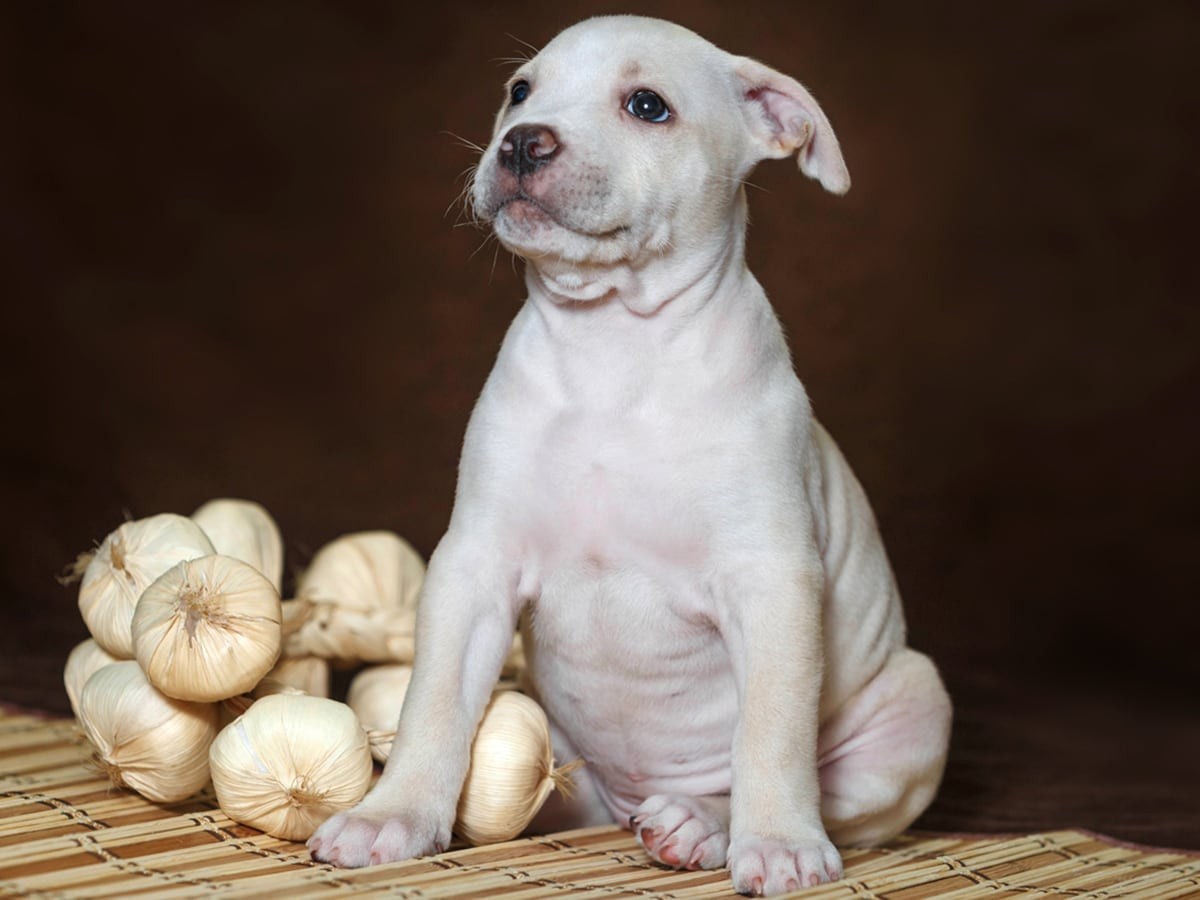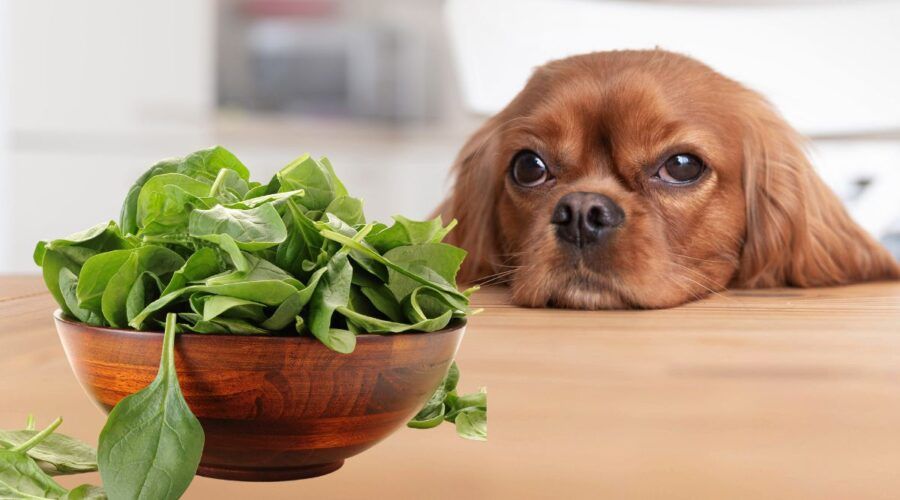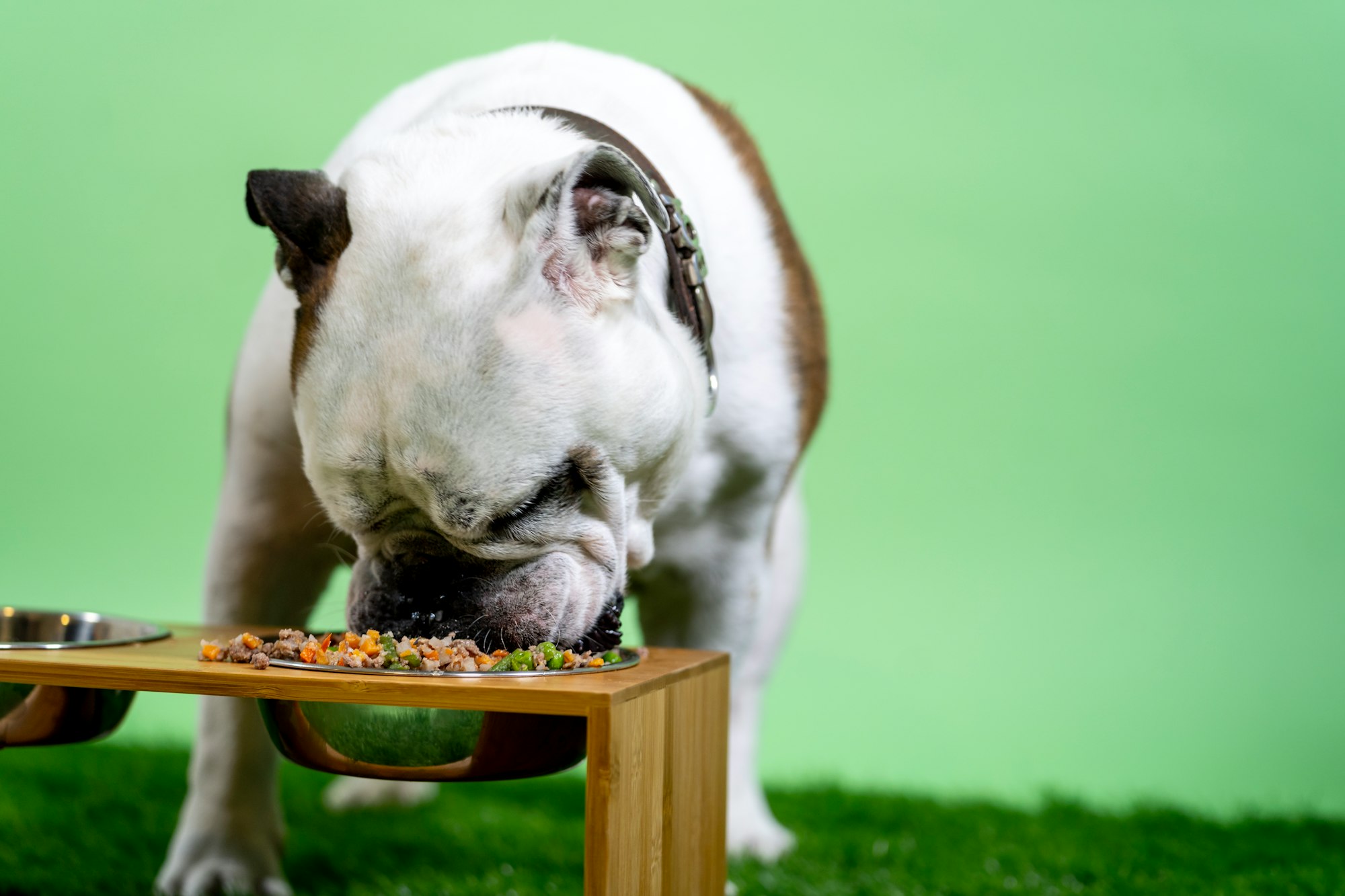Dogs are beloved pets and are considered part of the family. Pet owners want to ensure their dogs are healthy and safe, and this includes monitoring their diet. Garlic is a common ingredient in many human meals and has numerous health benefits. However, when it comes to dogs, the question arises: can dogs have garlic?
The answer is no. Garlic is toxic to dogs and can cause serious health problems, including anemia and damage to the digestive system. While garlic is safe for humans, dogs metabolize certain foods differently, and their bodies cannot handle the compounds found in garlic. Even small amounts of garlic can be harmful to dogs, and pet owners should avoid feeding their dogs any foods that contain garlic.

Key Takeaways
- Garlic is toxic to dogs and can cause serious health problems.
- Even small amounts of garlic can be harmful to dogs, and pet owners should avoid feeding their dogs any foods that contain garlic.
- Pet owners should be aware of the risks associated with feeding their dogs garlic and should seek alternative options for flavoring their dog's food.
Understanding Garlic
Garlic is a popular herb that is widely used in cooking due to its distinct flavor and aroma. It is a member of the onion family and is commonly used as a seasoning in various dishes. Garlic is known for its pungent energy and has been used for medicinal purposes for centuries.
However, when it comes to dogs, garlic can be harmful if consumed in large quantities. Garlic contains a compound called thiosulphate, which can damage red blood cells in dogs. This can cause a condition called hemolytic anemia, which can be life-threatening if left untreated.
While garlic is not recommended for dogs, there are some benefits to using other herbs in their diet. For example, parsley can help freshen breath, while ginger can help soothe upset stomachs. It is important to consult with a veterinarian before introducing any new herbs or supplements into a dog's diet.
In summary, Can Dogs Have Garlic? It should be avoided, as it can be harmful to them. Consult a veterinarian before introducing new herbs or ingredients to their diet.

Garlic and Its Effects on Dogs
Garlic is a common ingredient in many human foods, and some dog owners may wonder if it is safe to share this food with their furry companions. However, it is important to note that garlic can be toxic to dogs and should be avoided.
Garlic contains compounds that can damage a dog's red blood cells, leading to a type of anemia called hemolytic anemia. This can cause symptoms such as weakness, lethargy, and pale gums. In severe cases, dogs may experience rapid breathing, jaundice, and dark-colored urine.
The amount of garlic that can cause toxicity in dogs depends on their body weight, with smaller dogs being more susceptible. According to the American Kennel Club, a dose of about 15 to 30 grams of garlic can be dangerous for dogs.
Signs of garlic poisoning in dogs may include vomiting, diarrhea, abdominal pain, depression, loss of appetite, and dehydration. If a dog has ingested garlic, it is important to seek veterinary care immediately.
While garlic in small quantities may not result in side effects, it is best to err on the side of caution and avoid feeding it to dogs altogether. If a dog accidentally ingests garlic, it is important to monitor them closely and seek veterinary care if any symptoms of poisoning occur.
Allium Family and Its Impact
The Allium family is a group of plants that includes onions, chives, leeks, scallions, and garlic. These plants contain a compound called thiosulfate, which can be toxic to dogs. Thiosulfate causes oxidative damage to red blood cells, leading to a condition known as hemolytic anemia. Hemolytic anemia can be life-threatening if not treated promptly.
Garlic is particularly toxic to dogs and can be up to five times more toxic than onions. Even small amounts of garlic can cause serious health problems in dogs. Symptoms of garlic toxicity include vomiting, diarrhea, and difficulty breathing. In severe cases, dogs may experience collapse and even death.
It is important to note that not all members of the Allium family are equally toxic. Onions are more toxic than chives or leeks, and garlic is more toxic than onions. However, all members of the Allium family can cause health problems in dogs if ingested in large enough quantities.
If a dog has ingested any member of the Allium family, it is important to seek veterinary attention immediately. The veterinarian may induce vomiting to remove the plant material from the dog's stomach, administer activated charcoal to absorb any remaining toxins, and provide supportive care such as IV fluids and oxygen therapy.
In summary, dogs should not be given any member of the Allium family, including onions, chives, leeks, scallions, and garlic. These plants can cause serious health problems in dogs and should be kept out of their reach. If a dog has ingested any member of the Allium family, it is important to seek veterinary attention immediately to prevent serious health complications.

Garlic in Dog Food
Garlic is a common ingredient in many human foods, but is it safe for dogs to consume? While garlic is not toxic to dogs in small amounts, it can be harmful in large quantities.
Many commercial dog foods and treats contain garlic as an ingredient. Garlic is believed to have anti-bacterial properties and can aid in flea and worm control, as well as digestive support. However, it is important to note that the benefits of garlic have not been scientifically proven in dogs.
Some pet food manufacturers use garlic as a flavor enhancer in their products. Garlic powder is a common ingredient in many pet foods, but it is important to note that cooking, processing, or drying garlic does not make it any less toxic to dogs.
Garlic can cause damage to a dog's red blood cells, leading to anemia. Symptoms of garlic poisoning in dogs include vomiting, diarrhea, weakness, and difficulty breathing. If you suspect your dog has consumed garlic, it is important to seek veterinary care immediately.
In summary, it's best to avoid giving garlic to dogs, as it can be harmful. If you have doubts about a specific food's safety for your furry friend, consult your veterinarian. Can Dogs Have Garlic? Ensure their safety by seeking professional advice.
Specific Breeds and Garlic
While garlic is generally not recommended for dogs, some breeds may be more sensitive to its toxic effects than others. For example, Japanese breeds like Shiba Inu may be more susceptible to garlic toxicity due to genetic differences in their liver enzymes. Pregnant dogs and puppies are also more vulnerable to garlic toxicity.
It is important to note that even if a dog breed is not specifically listed as being sensitive to garlic, it is still not recommended to feed them garlic in any form. The potential risks of garlic consumption outweigh any potential benefits.
If a dog accidentally consumes garlic, it is important to monitor them closely for any signs of toxicity, such as lethargy, panting, or drooling. If the dog has ingested a large amount of garlic or is exhibiting severe symptoms, it is recommended to seek veterinary care immediately.
In general, it is best to avoid feeding dogs any human foods that contain garlic or garlic powder. Instead, opt for dog-specific treats and foods that are free of any potentially harmful ingredients.
Garlic's Nutritional Content
Garlic is a member of the Allium family, which also includes onions, shallots, and leeks. Garlic is a popular spice that is commonly used in cooking around the world. It is known for its strong aroma and flavor, but it also has a variety of nutritional benefits.
Garlic is low in calories, with one clove containing only about 4 calories. It is also a good source of vitamin C, vitamin B6, and manganese. Additionally, garlic contains small amounts of other nutrients, including calcium, potassium, phosphorus, and selenium.
Garlic is also a source of inulin, a type of dietary fiber that has been linked to various health benefits. Inulin can help promote healthy digestion and may also help regulate blood sugar levels.
While garlic does contain some beneficial nutrients, it is important to note that it is not a significant source of most vitamins and minerals. Therefore, it should not be relied upon as a primary source of nutrition for dogs.
Furthermore, garlic contains a compound called thiosulphate, which can be toxic to dogs in large quantities. It can cause anemia by damaging red blood cells, leading to weakness, lethargy, and even death. Therefore, it is recommended that dogs do not consume garlic in any form.
In conclusion, while garlic does contain some beneficial nutrients, it is not a primary source of nutrition for dogs. Due to its potential toxicity, it should be avoided in any form.

Garlic and Medical Treatments
If a dog has ingested garlic and is showing symptoms of garlic poisoning, it is important to seek veterinary care immediately. A veterinarian can determine if the amount of garlic consumed by the dog requires medical treatment or if the pet can be watched at home for symptoms of garlic poisoning.
If the dog has ingested a large amount of garlic, the veterinarian may induce vomiting to remove the garlic from the stomach. The dog may also receive oxygen therapy, blood transfusions, or activated charcoal to help remove the toxins from the body. Intravenous (IV) fluids may also be administered to help flush the system.
In cases of severe garlic poisoning, the dog may require supportive care, which may include hospitalization and monitoring of vital signs. In some cases, surgery may be necessary to remove any remaining garlic from the stomach or intestines.
It is important to note that garlic can interact with certain medications, so it is important to inform the veterinarian of any medications the dog may be taking. The veterinarian may need to adjust the dosage or switch to a different medication to avoid any potential interactions.
Overall, if a dog has ingested garlic and is showing symptoms of garlic poisoning, it is important to seek veterinary care immediately. With proper medical treatment, most dogs can recover from garlic poisoning.
Risks and Prevention
While garlic may have some health benefits for humans, it can be toxic to dogs. As little as 5 grams of whole garlic can cause adverse effects in dogs, and larger amounts can lead to severe poisoning.
Garlic contains compounds called disulfides and thiosulphates, which can damage a dog's red blood cells and cause anemia. Symptoms of garlic poisoning may include weakness, vomiting, diarrhea, pale gums, and rapid heart rate. In severe cases, the dog may collapse or experience organ failure.
To prevent garlic poisoning in dogs, it is essential to keep garlic and garlic-containing foods out of their reach. This includes garlic bread, garlic powder, and garlic supplements. If you suspect that your dog has ingested garlic, contact your veterinarian or the Pet Poison Helpline immediately.
If you have pet insurance, check your policy to see if it covers the treatment of garlic poisoning. Some policies may exclude coverage for certain types of poisoning, so it is important to know what is and is not covered.
In summary, Can Dogs Have Garlic? No, it's not safe for dogs. Prevent access to garlic and seek veterinary care if ingestion is suspected. Prioritize your dog's well-being by avoiding garlic
Alternatives to Garlic
While garlic can provide health benefits to humans, it is not recommended to give it to dogs in any form. However, there are plenty of safe and healthy alternatives to garlic that can provide similar benefits to your furry friend.
One of the best alternatives to garlic is turmeric, which has anti-inflammatory properties and can help with joint pain and other health issues. You can add a small amount of turmeric to your dog's food as a supplement or purchase turmeric supplements specifically designed for dogs.
Another great alternative is ginger, which can help with digestion and nausea. You can add fresh ginger to your dog's food or give them ginger supplements.
Other safe and healthy alternatives to garlic include:
- Cinnamon: can help with circulation and blood sugar levels
- Parsley: can help with bad breath and digestion
- Coconut oil: can help with skin and coat health, as well as obesity
- Blueberries: can help with cognitive function and blood clotting
It's important to remember that while these alternatives can provide health benefits to your dog, they should still be given in moderation and as part of a balanced diet. Always consult with your veterinarian before adding any supplements or new foods to your dog's diet.
In conclusion, while garlic may be a popular ingredient in human food, it is not safe for dogs to consume. However, there are plenty of safe and healthy alternatives that can provide similar benefits without any potential risks.
Frequently Asked Questions
What happens if a dog eats garlic?
Garlic can be toxic to dogs and cause a range of symptoms, including vomiting, diarrhea, abdominal pain, lethargy, and anemia. In severe cases, it can lead to organ damage and even death.
Is garlic toxic to dogs?
Yes, garlic is toxic to dogs. It contains compounds that can damage a dog's red blood cells and cause anemia. All forms of garlic, including fresh, cooked, and powdered, can be harmful to dogs.
How much garlic can be harmful to dogs?
Garlic can be dangerous to dogs in amounts of about 15 to 30 grams, according to the American Kennel Club. To put that into perspective, a typical bulb of garlic or a small onion weighs about 5 grams. Studies have shown that dogs that ingested 5 grams of whole garlic were not adversely affected.
What should I do if my dog eats garlic?
If your dog eats garlic, you should contact your veterinarian immediately. Depending on the amount ingested, your veterinarian may induce vomiting, administer activated charcoal, or recommend hospitalization for supportive care.
Can dogs have garlic in any form?
No, dogs should not have garlic in any form. All forms of garlic, including fresh, cooked, and powdered, can be harmful to dogs.
Are there any benefits of giving garlic to dogs?
While garlic is sometimes touted as a natural remedy for various health conditions in dogs, there is no scientific evidence to support its use. In fact, giving garlic to dogs can be harmful and should be avoided.






